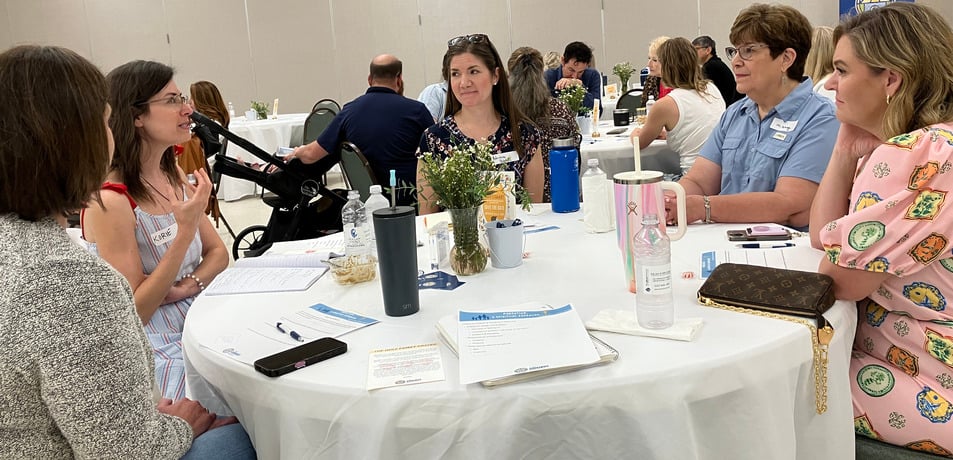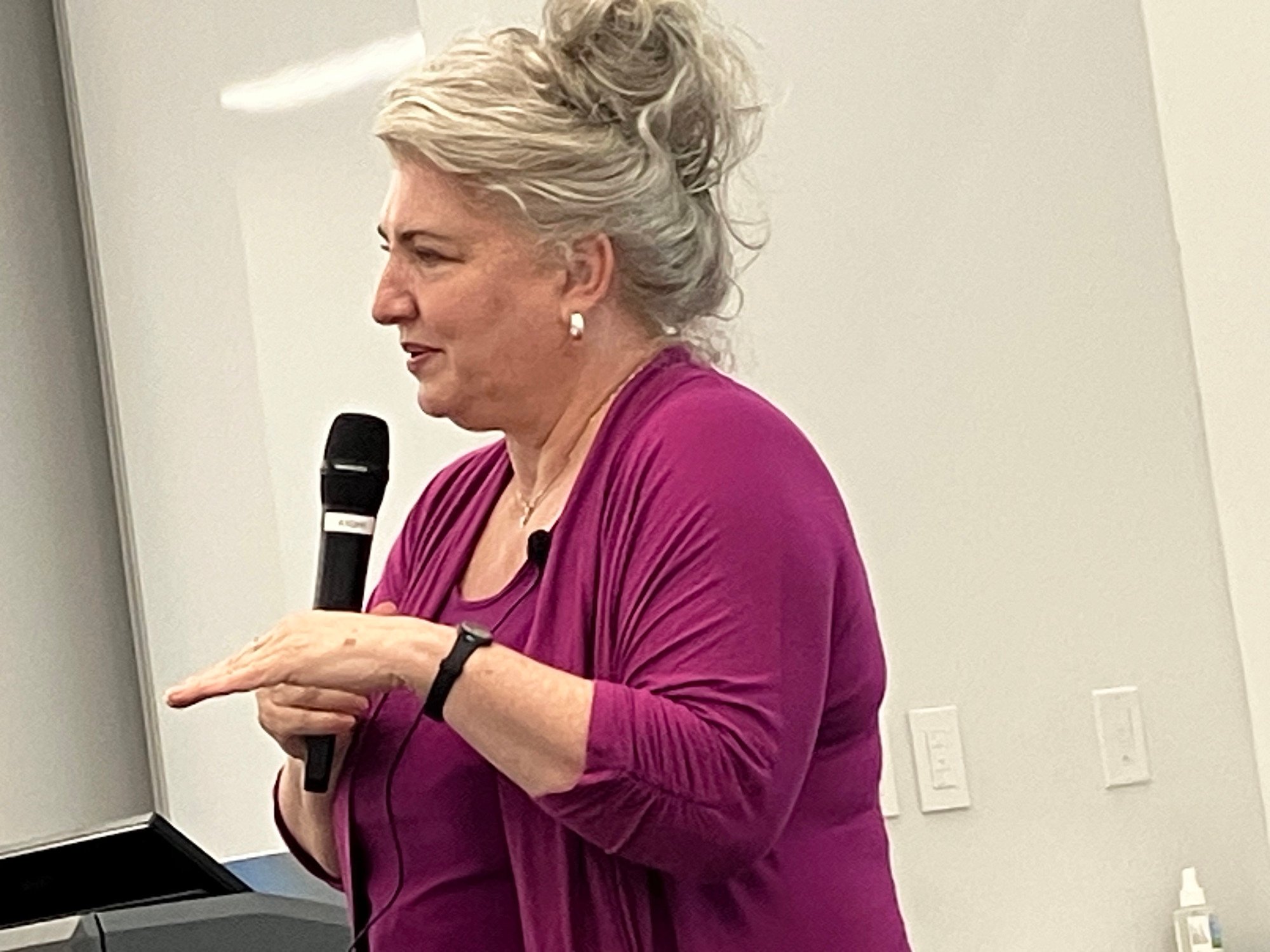Search
Parents Learn How to Survive, Build Domestic Church
-
 July 10, 2025Through her own personal experiences and conversations with other parents, Dr. Holly Taylor Coolman discovered that raising children involves combining daily activities and the big picture idea. As a theologian and a parent who is “also figuring it out,” she shares her wisdom through writing books and speaking about the “complex and beautiful vocation of raising children.”
July 10, 2025Through her own personal experiences and conversations with other parents, Dr. Holly Taylor Coolman discovered that raising children involves combining daily activities and the big picture idea. As a theologian and a parent who is “also figuring it out,” she shares her wisdom through writing books and speaking about the “complex and beautiful vocation of raising children.”
Coolman, assistant professor of theology at Providence College, Rhode Island, spoke twice in Baton Rouge. Her first lecture at FranU was themed “Overwhelmed? A survival Guide for Parents.”
“I think we are overwhelmed for a number of different reasons. It can affect families differently,” said Coolman. “I think for a number of years there’s been a steady increase in the frenetic pace that families are trying to keep up with – a kind of busyness that we don’t even describe as busyness because it’s just the normal pace of life now. We just call it life.
“The challenges we are facing are never more apparent than at the moment we call ‘dinner time.’
Coolman pointed out the kids are often tired and parents wonder, for example, who’s watching the three-year-old while dinner is being prepared.
“It doesn’t add up. Let’s throw in that everyone has low blood sugar and is hungry,” she said.
When overwhelmed, Coolman added, it’s good to stop parenting.
The word “parenting” became part of the English language in the 1970s and has steadily increased over the years, she said.
Historically, as the economy changed from an agricultural economy, to industrial, and then to a digital economy, certain communities have dissolved.
When agriculture was the primary economic driver, families lived closely together with shared experiences. That included extended families and communities.
As economic changes occurred, men and women worked in jobs that took them away from home.
In the past, raising children took place within an adult life of work, play, rest cooking, etc. It was a part of the whole of an adult’s life. Now it is an isolated project. Top right photo: Attendees at the parenting workshop discussed in small groups issues that are important to them.
Top right photo: Attendees at the parenting workshop discussed in small groups issues that are important to them.
Above photo: Dr. Holly Taylor Coolman talks about the concept of apprenticeship in raising children. Photos by Debbie Shelley | The Catholic Commentator
“The process involves producing a certain kind of child ... The children themselves become the products that are being offered to the world,” Coolman explained.
She suggested parents let go of the idea of “training their children to turn out right,” and focus on fundamental things. She encouraged parents to think of children as their apprentices since apprenticeship is a slow process of working alongside each other.
Children watch their parents doing a task or craft, and then do what their parents did and become “themselves” while learning about the task or craft.
“That time you spend with them is powerful form of communication with formation,” Coolman said.
Parents are also called to create a community of tenderness, she emphasized.
“Pope Francis spoke famously about a ‘revolution of tenderness’ that connects our lives with each other,” she said.
Allen Richey, who attended the FranU presentation with his wife, Jenny, resonated with Coolman’s comments about practicing apprenticeship in raising children.
“It was nice to pose the question and step back and reflect on if we are truly apprenticing our children to grow and be, full, complete, good people. Are we apprenticing them, and what measures of control and managerial focus should we worry about? Should we know that there's a broader art (of raising children) and we need to focus on the apprenticeship?” he said.
Dr. Coolman’s second local presentation at Our Lady of Mercy Church on June 28 was titled, “Parenting: A Spiritual Endeavor.”
Coolman and her husband, Boyd, are parents of five adopted children and grandparents of a toddler. Having moved around with the family, Coolman said it was nice to finally settle into a community centered around a parish.
“I can look out the living room window and see the church,” said Taylor Coolman.
She noted the church has a “beautiful impact on the geographical location.”
“I probably know a dozen families within a short walk from my home that I could call on any time of the day or night,” Coolman said.
The Coolmans often have friends over for dinner or go to a friend’s house for dinner.
Fridays include a community pizza night that she and another mom established.
“No matter what’s going on there’s no chance we’re cooking on a Friday night,” Coolman said.
She’s also experienced the support of friends during trials. When the children were young, she had burnt some pinto beans on the stove, and the house reeked with the smell of the burnt beans. Friends showed up to help clean, wash laundry, etc.
“I was so aware of how important that was to feel that group of people coming around me. It really changed me in ways that are even hard to articulate.”
Coolman said churches also offer support to people in need. An Italian parish, for example, may hold a spaghetti fundraiser to help people.
When faced with “matters of the heart,” however, families can feel the pressure to put on a “We’re okay” face, Coolman cautioned.
There are also times when it is hard to find support during life’s struggles: going to the police station because a child has been arrested, going to the emergency room when a child has overdosed on drugs, unexpected pregnancies, etc.
It can also apply to “smaller moments” when parents must make decisions that seem scary and they are uncertain about what direction to take, according to Coolman.
Attendees also discussed in small groups: The most important ways in which their communities could be present with families; the most important habits, skills, and attitudes they would like to apprentice in their children; how and where they found opportunities for rest, creativity, and friendship; and what it means for them to anchor their parenting in a larger sense of tender calling.
As a fellow mother of adopted children, Danielle Thompson, who attended the OLOM presentation, connected with Coolman in a special way. She and her husband, Terry, who have struggled with infertility, adopted two children: Alayna, 6, and Zayden, 4.
“We're such a pro-life church, which is beautiful,” Thompson said. “But when you're walking through something like infertility, you could feel like you're falling through the cracks within the diocese or your parish or the community.”
Her positive experiences at Saturday’s program encouraged her to attend future Dominus Project presentations.
“I think it's really cool what they're doing,” Thompson said. “I think it's a very unique ministry. They don't seem like they're limited in what they offer. It seems like they're trying to touch any part of family life within the Catholic Church.”
